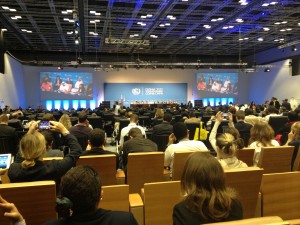Now that the dust from Doha has settled and 2013 is off and running, we’ve had a chance to reflect on how the UN climate talks have, once again, left us asking… What have we achieved? How have we advanced the debate? Where do we go from here?
 Like many other civil society groups, our assessment of COP18 was that it was plagued by failed ambition and unfulfilled promises – while countries recognized the need for urgent action to respond to climate change, they didn’t take the necessary action to protect the rights of peoples and communities affected by climate impacts. The talks demonstrated a serious lack of political will to take decisive action now, with governments punting critical decisions to the coming years.
Like many other civil society groups, our assessment of COP18 was that it was plagued by failed ambition and unfulfilled promises – while countries recognized the need for urgent action to respond to climate change, they didn’t take the necessary action to protect the rights of peoples and communities affected by climate impacts. The talks demonstrated a serious lack of political will to take decisive action now, with governments punting critical decisions to the coming years.
And yet, the devastating impacts of climate change felt by peoples and communities around the world have made it all too clear: we need to act now before it’s too late.
At CIEL, we advocate for a human rights-based approach to addressing climate change. We demand that international climate talks fully address the rights and interests of those most vulnerable to, but least responsible for, climate change. Back in 2010, our collective voices were heard when the UNFCCC took a significant first step in recognizing the link between climate change and human rights. For the first time in the climate negotiations, countries agreed that climate change is not only an environmental problem but also a human rights issue for the millions of people and communities experiencing rising sea levels, increasingly severe floods and storms, melting glaciers, groundwater contamination, health impacts, forced relocation and displacement, and other adverse impacts. Despite this recognition and with it the increasing urgency of international action, governments did not take any meaningful steps to protect human rights in the decisions adopted in Doha (known as the Doha Climate Gateway).
 Outside the negotiating rooms, however, the effects of climate change on peoples and communities were at the forefront of concerns from activists, community leaders, indigenous groups and many others. Although the formal negotiations did not provide space for these discussions, people found opportunities to share their experiences in dealing with climate change, from communities in the Arctic to small island states, and all points in between. For example, panelists at CIEL’s side event “Advancing Human Rights in the Climate Framework: Where Are We Now and Where Are We Going?” described the impacts of climate change on their communities and their efforts to address the problem, making a powerful argument as to why human rights considerations should be integrated into climate decisions. Their message was quite clear: While our voices may be sidelined in the formal negotiations, we will not be silenced. And our voices are only getting louder.
Outside the negotiating rooms, however, the effects of climate change on peoples and communities were at the forefront of concerns from activists, community leaders, indigenous groups and many others. Although the formal negotiations did not provide space for these discussions, people found opportunities to share their experiences in dealing with climate change, from communities in the Arctic to small island states, and all points in between. For example, panelists at CIEL’s side event “Advancing Human Rights in the Climate Framework: Where Are We Now and Where Are We Going?” described the impacts of climate change on their communities and their efforts to address the problem, making a powerful argument as to why human rights considerations should be integrated into climate decisions. Their message was quite clear: While our voices may be sidelined in the formal negotiations, we will not be silenced. And our voices are only getting louder.
While the UNFCCC continues to be an important forum for climate action, we cannot sit by while year after year countries pass hollow agreements. Around the world, grassroots movements and advocates are mobilizing for a more sustainable future, one that respects the rights of people who are affected by climate change. These movements will be a powerful force in effecting global change. CIEL will be contributing to these efforts by developing the legal strategies and tools needed to protect (and in some cases compensate for) the lives and livelihoods threatened by climate change.
Originally posted on January 9, 2013.
